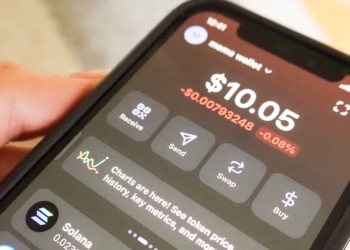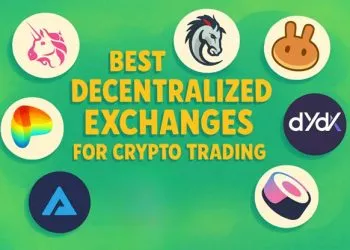Whether you’re buying your first $100 in crypto or actively managing a five-figure portfolio, choosing the right exchange can make a huge difference.
Why?
Because each platform offers a different mix of features, security standards, supported tokens, and user experience — and in a space that moves this fast, using the wrong one could cost you time, money, or even your assets.
In this guide, we’ve ranked the top 7 crypto exchanges in 2025 based on real-world user needs — not hype. Whether you’re a beginner or a pro trader, here’s where to trade smarter this year.
🧠Our criteria: fees, security, KYC requirements, supported coins, and overall user experience.
The 7 Best Crypto Exchanges in 2025
These following picks are considered the best exchange platforms by experienced traders around the world.
1. Binance
Binance continues to dominate the crypto exchange landscape with its massive token selection (350+), ultra-low fees (0.1%), and robust trading tools. From spot and futures to staking, launchpads, and DeFi integration — it’s the go-to platform for both beginners and advanced traders.
The user experience is smooth across mobile and desktop, and the platform consistently leads in liquidity and volume. Binance also offers Proof of Reserves, regular audits, and native wallet integrations for safer custody.
🔍 Key Info
- Available globally
- Fees: 0.1% spot (lower with BNB)
- Best for: All-in-one users, active traders
2. Kraken
If safety and compliance are your top priorities, Kraken is hard to beat. With one of the longest-standing reputations in crypto, it’s a top choice for users in the US and EU. It provides excellent fiat on/off ramps, institutional-grade cold storage, and transparent regulatory adherence.
Although its UX isn’t the flashiest, it offers deep liquidity, reliable customer support, and peace of mind for long-term holders.
🔍 Key Info
- US- & EU-regulated
- Fees: 0.16%–0.26%
- Best for: Security-first investors and institutions
3. Bybit
Bybit has become the go-to platform for derivatives traders, offering up to 100x leverage on futures, fast execution, and a clean trading interface. It supports hundreds of pairs and also includes copy trading, options, and passive earn tools.
It’s great for traders looking for a pro-grade experience, with one of the lowest fee structures among advanced exchanges.
🔍 Key Info
- Leverage: up to 100x
- Fees: 0.01% maker / 0.06% taker
- Best for: Futures traders, pro-level users
4. OKX
OKX combines a top-tier trading engine with direct Web3 access, making it the best choice for users who want to dive into NFTs, DeFi, and cross-chain swaps — all from one platform. It’s known for altcoin variety, deep liquidity, and affordable fees.
You also get access to an integrated DeFi wallet, launchpad, and native staking tools.
🔍 Key Info
- Built-in DeFi & NFT features
- Fees: 0.08%
- Best for: Web3 explorers & altcoin traders
5. MEXC
For traders seeking privacy and access to smaller-cap tokens, MEXC is the best no-KYC exchange in 2025. With over 1,500 tokens listed and frequent zero-fee promotions, it’s the ultimate playground for altcoin hunters and degen traders.
However, its regulatory footprint is limited — so use it wisely.
🔍 Key Info
- No KYC required (limits apply)
- Fees: Often 0% spot / 0.1% default
- Best for: Anon traders & gem seekers
6. Bitget
Bitget has positioned itself as the leading exchange for copy trading — where users can mirror top traders with a single tap. It’s beginner-friendly, yet packed with tools for futures, staking, and yield generation. Copy trading stats are fully transparent, making it ideal for learning and earning.
It’s also building out its launchpad and ecosystem support for early-stage tokens.
🔍 Key Info
- Copy trading included
- Fees: 0.02% maker / 0.06% taker
- Best for: Passive earners & beginners
7. Coinbase
Coinbase remains the top fiat gateway for new users thanks to its clean interface, high regulatory compliance, and top-tier customer support. It’s easy to use, fully insured in the US, and offers tax reporting tools — but charges noticeably higher fees compared to competitors.
For those starting their crypto journey, it’s the most accessible and secure option.
🔍 Key Info
- Regulated in 100+ countries
- Fees: ~1.49% per transaction
- Best for: Beginners & long-term holders
Top Crypto Exchanges Comparison Table (2025)
| Exchange | Fees (Spot) | KYC Required | Best Feature | Coins Listed | Security Rating |
| Binance | 0.10% (0.075% w/ BNB) | ✅ Yes | All-in-one tools, liquidity | 350+ | ⭐⭐⭐⭐☆ |
| Kraken | 0.16–0.26% | ✅ Yes | Regulated & secure | 200+ | ⭐⭐⭐⭐⭐ |
| Bybit | 0.01% / 0.06% | ✅ Partial (limits w/o KYC) | Pro-level futures | 300+ | ⭐⭐⭐⭐☆ |
| OKX | 0.08% | ✅ Yes | Web3 + DeFi access | 300+ | ⭐⭐⭐⭐☆ |
| MEXC | 0%–0.1% | ❌ No | No KYC | 1500+ | ⭐⭐⭐☆☆ |
| Bitget | 0.02% / 0.06% | ✅ Yes | Copy trading + earn | 500+ | ⭐⭐⭐⭐☆ |
| Coinbase | ~1.49% | ✅ Yes | User-friendly + regulated | 200+ | ⭐⭐⭐⭐⭐ |
How to Choose the Right Centralized Exchange (CEX)
When selecting a centralized exchange (CEX), the goal isn’t to find the “perfect” platform — it’s to find the one that best fits your profile, strategy, and priorities.
Start by understanding what matters most to you. Are you looking for ease of use as a beginner? Or do you need advanced tools for trading, staking, or portfolio management? Perhaps you value privacy and want minimal identity verification — or you’re focused on low fees and fast execution.
It’s also important to consider:
- Security standards: Check for two-factor authentication (2FA), proof of reserves, cold storage, and insurance policies.
- KYC policies: Some platforms require full ID verification, while others offer limited access without it.
- Supported assets: Not all exchanges list the same coins — if you want access to newer altcoins or stablecoins, look for platforms with broader listings.
- User experience: Whether you’re using mobile or desktop, the interface should be intuitive, especially if you’re new to crypto.
- Regulatory compliance: Depending on your country, local regulations may limit access to certain features or exchanges.
Ultimately, choosing a CEX is about balancing security, convenience, features, and control. You may find that combining multiple platforms gives you the best overall setup — for example, using one for fiat transactions, another for low-fee trading, and another for DeFi or NFTs.
Final Thoughts
There’s no one-size-fits-all exchange. Your choice will depend on your experience level, investment goals, and how much control or flexibility you want when managing your crypto.
Some users prioritize simplicity and compliance, others value advanced tools or trading options, and many look for ways to maximize privacy and minimize fees.
No matter what your priorities are, always remember to:
- Start with small amounts
- Enable all available security settings
- Never store large amounts of crypto on an exchange long-term
Your exchange is just one part of your crypto journey — choose wisely, stay informed, and make sure it supports the way you want to interact with the blockchain.










